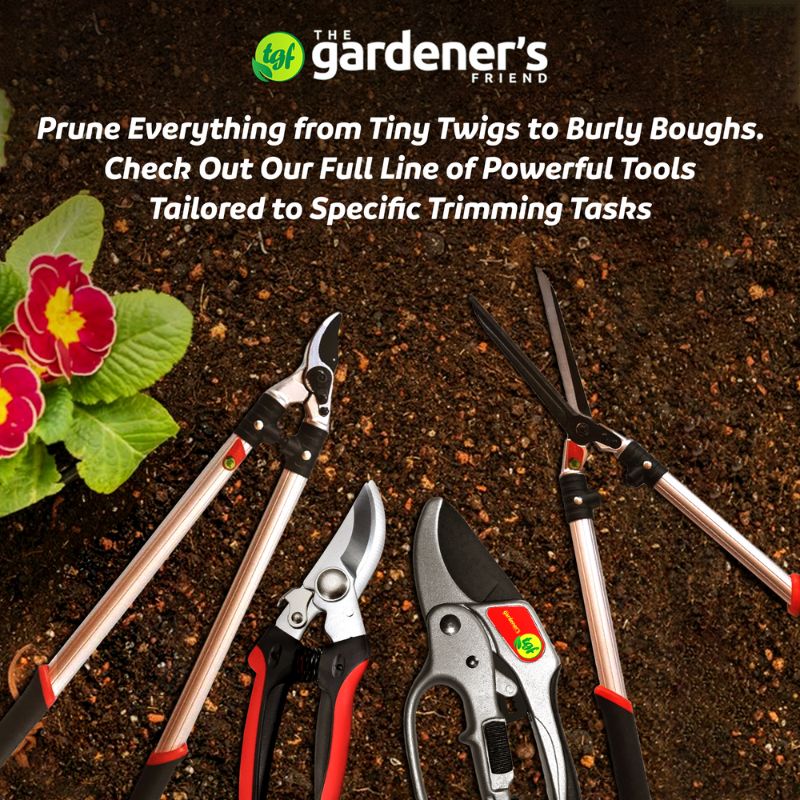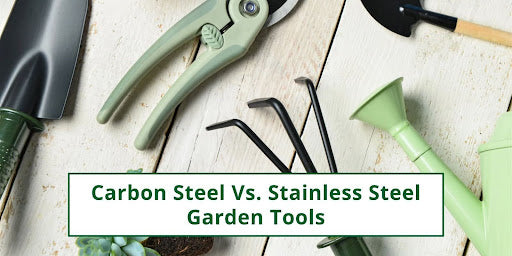Having the right gardening tools under your shed can save you time, effort, and money in the long run.
Picking a gardening tool for a task isn’t just about aesthetics or price.
The decision comes down to the qualities it has, how long it lasts, and how much maintenance it needs, among other things.
In this blog post, we’ll compare carbon steel vs. stainless steel garden tools, helping you decide which one to choose for which gardening task.
Here’s a short answer before we dive deeper: If you want your tools to last a long time without gathering rust, stainless steel is perfect. And, if you want them to be stronger and sharper but can manage some regular maintenance, carbon steel is your friend.
Let’s dive deeper.
Carbon Steel Vs. Stainless Steel Garden Tools: The Basics
Carbon Steel: Carbon steel is just iron with a small percentage of carbon in it (0.5% to 1.5%). This carbon makes it strong and holds a sharp edge for longer, but it rusts easily when exposed to a humid atmosphere.
Stainless Steel: SS is another type of steel with a decent amount of chromium (Starting from 10.5%).
Chromium creates the magic here; it forms a passive layer that fights rust exceptionally well.
Reasons to Use Carbon Steel Garden Tools (Pros)
Now, let’s dive into the real-world pros and cons of these materials for gardeners.
Sharper and Stays Sharper
This is where carbon steel shines the most. The steel is durable and tough and takes on a fine, sharp edge that remains sharp for an extended period.
This means a carbon steel pruning shear will create smooth, clean cuts, and a shovel will bite into tough soil better. A carbon steel blade will also need less frequent sharpening.
Strong and Tough
Carbon steel blades can bear heavy abuse. You can dig in compacted clay and chop roots, and it won’t bend, dent, or snap even under extreme force.
Often Affordable
Generally speaking, carbon steel gardening tools offer more tool strength upfront as compared to what you’re investing.
Reasons Not to Use Carbon Steel Garden Tools (Cons)
Rusts Easily
This is the biggest drawback of using carbon steel tools, especially if you garden in moist or humid weather.
Water and humidity act as a slow poison for metals (Unless they have effective protection); carbon steels are no exception.
When spread across the tool, rust can weaken the tool and eventually make it virtually useless.
High Maintenance
You need to clean and dry carbon steel tools after each use. A quick water splash with a hose isn’t enough. You need to thoroughly clean and dry the tool before storing it. Applying oil now and then is also important, as it prevents rust buildup.
Reasons to Use Stainless Steel Garden Tools (Pros)
Super Rust-Resistant
This is a superpower of stainless steel tools; they don’t rust easily. Even in rain, damp soil, and morning dew, you can use them without worry.
That’s a huge piece of mind, especially if you garden in moist conditions.
Low-Maintenance
This one ties to the previous benefit; since stainless steel garden tools don’t rust easily, they’re easier to maintain.
All they need is a rinse off and drying. But a little extra care goes a long way when it comes to prolonging the tool’s life.
Reasons Not to Use Stainless Steel Garden Tools (Cons)
Softer Edge (Generally)
Stainless steel tools tend to need frequent sharpening, especially when compared to carbon steel tools.
It doesn’t hold the sharp edge for too long, so you need to use your sharpening device (Stone or file) more often.
You May Also Like: Sharpening Hedge Trimmers (A Guide)
Potentially Higher Cost
Crafting high-quality, tough stainless steel tools generally costs more than carbon steel manufacturing. You’re essentially paying for rust-resistance.
Carbon Vs. Stainless Steel Tools: When to Use Which
Pick a tool better suited to your plant’s needs. If you prefer peak performance, want your tool to stay sharp for longer, and have less time for maintenance, go with carbon steel variations.
But, keep in mind the trade-off: Faster rust build-up, especially in moist and humid conditions.
If longevity is your top priority, and you don’t mind sharpening your garden tools often, stainless steel may be the better choice.
It may cost a bit more upfront, but the benefits are worth the extra investment.
Important: Remember that stainless steel is rust-resistant, not rust-proof. So, you still need to keep it clean and dry. Otherwise, over time, your SS tools may also rust.
Frequently Asked Questions
Let’s cover some commonly asked questions about carbon steel and stainless steel garden tools.
Are Carbon Steel Garden Tools Better Than Stainless Steel?
Not universally. Carbon steel is tougher and holds a sharp edge for longer, but it rusts more easily. Stainless steel resists rust with minimal maintenance, but its sharp edges get dull faster. “Better” depends on your gardening needs.
What is the Best Metal for Garden Tools?
There’s no single “Best” metal. Pick carbon steel if you prefer sharpness and toughness. Go with stainless steel for superior rust-resistance, little maintenance, and longevity.
Is Stainless Steel Good for Gardening?
Yes, stainless steel gardening tools are ideal for many tasks because they resist rust and corrosion. For instance, shovels, spades, and trowels are constantly exposed to moisture; they can last longer if they’re made of SS.
Will Stainless Steel Rust in Soil?
High-quality garden-grade stainless steel is highly resistant to rust, but not 100% immune to it. Prolonged exposure to acidic soils, fertilizers, or salt can lead to pitting.
Conclusion
Carbon and stainless steel both have some unique properties. One tool may perform better than the other in certain tasks.
So, it’s your plants’ needs and gardening conditions that should decide which one is right for you.
Ask yourself a few questions before making up your mind about a specific material or tool:
- How much time can I give to maintenance?
- How hard is my soil? Do I hit rocks often?
- How humid is my climate?
Answers to these questions will help you naturally land on a tool that’s better suited to your needs and preferences.
Read More: Electric Pruning Shears (Are They Worth It?)


